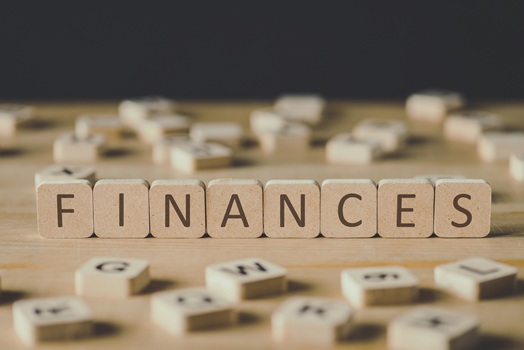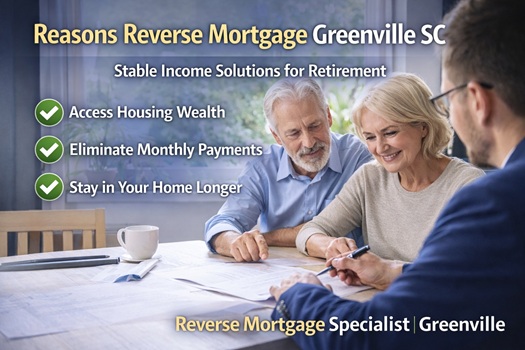
pay off mortgage in Greenville SC
Retirement should bring stability, yet many homeowners continue to feel pressure from monthly loan obligations. As income becomes more fixed, housing costs often stand out as one of the largest expenses that never seems to go away. Because of this, many retirees begin looking for ways to pay off mortgage debt without selling their home or disrupting their lifestyle. A reverse mortgage can offer that opportunity when used carefully and with proper planning.
For homeowners who want predictability, removing a required payment can make a meaningful difference. Instead of adjusting spending every month, finances can finally feel balanced again. That relief often allows retirees to focus on long-term comfort rather than short-term survival. This is why understanding how this option works is essential before making a decision.
How A Reverse Mortgage Strategy Works In Practice
A reverse mortgage strategy allows eligible homeowners to convert part of their home equity into loan proceeds. Those proceeds are applied first to eliminate the remaining loan balance on the property. Once that happens, the obligation to make monthly mortgage payments ends. As a result, cash flow often improves immediately.
Unlike traditional refinancing, repayment is not required on a monthly basis. Instead, the loan balance grows gradually over time and is settled later when the home is sold. This structure is why many retirees use this option as part of broader retirement mortgage planning. When used correctly, it replaces pressure with flexibility.
This approach is particularly relevant for homeowners who plan to remain in their property long-term. Removing a recurring expense often makes retirement income feel more sustainable. For many, that trade-off feels practical rather than risky.
Monthly Financial Relief Without Leaving Your Home
One of the most appealing outcomes of using home equity is the ability to stay put. Downsizing is not always desirable, especially when emotional attachment and community ties matter. A pay off mortgage allows homeowners to remain in their residence while easing financial strain.
Once the loan is cleared, the budget shifts noticeably. Money that once went toward housing payments can be redirected toward healthcare, travel, or savings. This change often improves financial confidence and emotional well-being at the same time.
For many homeowners in Greenville SC, this shift creates breathing room that had been missing for years. Removing that obligation can make fixed income feel far more workable. Stability becomes achievable rather than uncertain.
Costs And Trade-Offs You Need To Understand
While the benefits are clear, the costs must be evaluated carefully. Reverse mortgages include origination fees, closing costs, and interest that accumulates over time. Government-insured options may also include mortgage insurance premiums. These expenses reduce remaining equity gradually.
That said, private programs sometimes offer alternative structures. Comparing options side by side helps homeowners understand how different fees affect outcomes. Transparency is essential before moving forward.
Because this is a long-term financial decision, reviewing estimates carefully is critical. Working with pay off mortgage professionals who explain numbers clearly helps prevent misunderstandings later. Thoughtful analysis now protects confidence later.
How This Decision Affects Family And Benefits

Reverse mortgage in Greenville
Using home equity in retirement can impact future inheritance. Because the loan balance increases over time, less equity may remain for heirs. For this reason, open family discussions are strongly encouraged before finalizing any plan.
In addition, proceeds typically do not affect Social Security or Medicare. However, funds that sit in accounts too long may affect needs-based programs. Planning ahead helps avoid unintended complications.
This is where a home equity retirement solution must align with broader financial goals. Coordination with advisors ensures decisions are made intentionally. Clarity now prevents stress later.
The Step-By-Step Process Explained Clearly
Every reverse mortgage begins with mandatory counseling. This independent session ensures homeowners understand obligations, alternatives, and outcomes. After counseling, the application process begins with financial verification.
Once approved, the lender uses proceeds to clear the existing loan balance. Any remaining funds are distributed based on the chosen payout method. At that point, monthly payments tied to the old loan stop completely.
Paying off the mortgage protects borrowers and sets clear expectations. It also ensures that responsibilities such as taxes and insurance remain manageable. Proper understanding keeps the experience smooth and predictable.
Is This The Right Move For Your Retirement Plan?
Deciding whether to use pay off mortgage depends on health, longevity, and financial priorities. For many retirees, eliminating a housing payment creates long-term security. For others, alternative strategies may be more appropriate.
This decision works best when it supports personal goals rather than short-term relief alone. Evaluating future needs matters just as much as solving current ones. That balance defines a strong plan.
Reverse Mortgage Specialist Greenville works with clients to evaluate whether this option fits responsibly. Their experience helps ensure decisions align with real-world retirement needs rather than assumptions.
Questions About Pay Off Mortgage
Can a reverse mortgage fully pay off mortgage debt?
Yes, provided enough equity exists, the loan proceeds are applied first to eliminate the current mortgage balance entirely.
What happens if equity does not cover the full balance?
In some cases, additional funds may be required or alternative structures may be considered before proceeding.
Does this option affect ownership of the home?
No, homeowners remain on title and retain ownership as long as loan obligations are met.
Reducing housing expenses can reshape retirement in powerful ways. If eliminating monthly payments is part of your financial goal, professional guidance matters. Reverse Mortgage Specialist Greenville helps homeowners evaluate options with clarity and confidence. A thoughtful conversation today can lead to long-term stability tomorrow.
Reverse Mortgage Specialist
Greenville, SC 29607
843-491-1436



